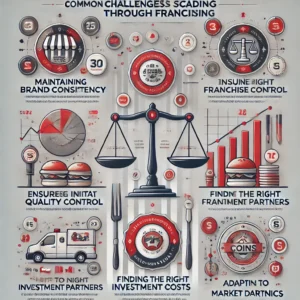Navigating the Challenges of Restaurant Franchising Success
- Phone: +1(833)PHX-Geek
- 712 H St NE Suite 1904 Washington, D.C. 20002
Are you looking to come to Toast POS? Follow this link to sign up and get a free quote from your local Toast Rep. They will come out to your restaurant, and give you a free, no obligation quote.
Scaling a restaurant through franchising can be a lucrative strategy for growth. However, it comes with a set of unique challenges that can deter even the most experienced restaurateurs. This article explores the intricacies of franchising, the common obstacles encountered, and the best practices for overcoming them to ensure a successful expansion. 
Franchising allows restaurant owners to expand their brand by permitting other entrepreneurs to operate under their business model. This approach not only increases market presence but also generates additional revenue streams through franchise fees and royalties. Many successful restaurant chains started as a single location, utilizing franchising as a pathway to reach broader audiences.
However, understanding the franchising framework is crucial. It involves meticulously developing operational manuals, training programs, and marketing strategies that potential franchisees will rely on. By establishing a strong foundation, restaurant owners can create a replicable business model that attracts and retains franchise partners.
Franchising also offers a unique opportunity to capitalize on local markets. Franchisees often have a better understanding of regional preferences, allowing for tailored menu offerings that align with customer tastes. This can enhance the dining experience and strengthen brand loyalty, leading to long-term success.
 Despite its advantages, franchising presents several challenges that can hinder growth. One of the most significant hurdles is maintaining brand consistency across multiple locations. As restaurants expand, ensuring that each franchise upholds the same standards of quality, service, and atmosphere becomes increasingly complex.
Despite its advantages, franchising presents several challenges that can hinder growth. One of the most significant hurdles is maintaining brand consistency across multiple locations. As restaurants expand, ensuring that each franchise upholds the same standards of quality, service, and atmosphere becomes increasingly complex.
Another challenge is the recruitment and training of franchisees. Not all potential franchisees possess the necessary skills or mindset to successfully operate a restaurant. Therefore, restaurant owners must implement robust training programs that not only educate franchisees about operational procedures but also instill the brand's core values and customer service principles.
Additionally, navigating the legal and regulatory landscape of franchising can be daunting. Each state or country may have different laws governing franchise agreements, requiring restaurant owners to stay informed and compliant to avoid potential legal issues that could derail expansion efforts.
To overcome these challenges, restaurant owners can adopt several strategic solutions. Developing a comprehensive franchise operations manual is essential to standardize practices across all locations. This document should encompass everything from food preparation techniques to staff training protocols, ensuring all franchisees operate in alignment with the brand's vision.
Investing in technology is another effective strategy. Utilizing point-of-sale systems, inventory management tools, and customer relationship management software can streamline operations, making it easier for franchisees to manage their restaurants efficiently. These tools provide valuable insights into performance, allowing for timely adjustments and improvements. 
Moreover, fostering a strong relationship between franchisors and franchisees is vital for long-term success. Regular communication, support, and collaborative problem-solving can create a sense of partnership that motivates franchisees to succeed. By prioritizing these relationships, restaurant owners can build a thriving franchise network.
Examining successful restaurant franchises can provide valuable insights into effective scaling strategies. For instance, brands like McDonald's and Subway have successfully navigated the franchising landscape by prioritizing brand consistency, rigorous training, and technological adaptation.
McDonald's, for example, emphasizes its operations manual, which is a critical resource for franchisees. This manual articulates every aspect of running a McDonald's restaurant, from food preparation to customer service. Their commitment to quality control ensures that every location offers the same experience, no matter where it is located.
Similarly, Subway has leveraged technology to streamline operations and enhance customer engagement. Their online ordering system and mobile app have positioned them as a leader in the fast-casual sector, demonstrating the importance of innovation in scaling a restaurant franchise effectively.
 Scaling a restaurant through franchising is a multifaceted endeavor that requires careful planning and execution. By understanding the opportunities and challenges, implementing strategic solutions, and learning from successful case studies, restaurateurs can navigate this complex landscape and achieve sustainable growth. With dedication and the right approach, franchising can be a powerful tool for transforming a single restaurant into a thriving national brand.
Scaling a restaurant through franchising is a multifaceted endeavor that requires careful planning and execution. By understanding the opportunities and challenges, implementing strategic solutions, and learning from successful case studies, restaurateurs can navigate this complex landscape and achieve sustainable growth. With dedication and the right approach, franchising can be a powerful tool for transforming a single restaurant into a thriving national brand.